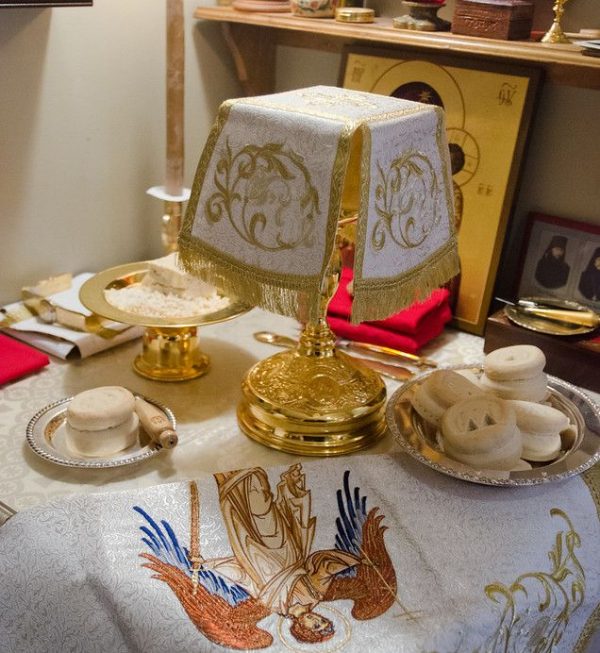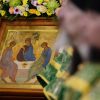A headline caught my eye several days ago: “They Tried to Start a Church Without God. For a While, It Worked.” While the concept of a church without God is beyond doubt bizarre, it nevertheless also makes perfect sense. In our age of loneliness, amidst the near-total collapse of practically every traditional form of community and social structure, to abandon Christianity is to hurtle oneself into the void foretold by Nietzsche when he proclaimed the “murder” of God:
What were we doing when we unchained this earth from its sun? Whither is it moving now? Whither are we moving? Away from all suns? Are we not plunging continually? Backward, sideward, forward, in all directions? Is there still any up or down? Are we not straying, as through an infinite nothing? Do we not feel the breath of empty space? Has it not become colder? Is not night continually closing in on us?
Living in cities, we become strangers. We visit our friends by sitting alone and staring at screens. Moving from job to job and from place to place, we remain rootless — only half-committed to our own lives. When my parents moved into a new subdivision outside Raleigh, North Carolina in 1999, they purchased the last new house on the street. In less than two decades, every single family on that street had moved away besides them. More and more, our lives have absolutely nothing to do with the people right around us. Half of all American children will even experience the shattering of their own home through divorce before the day they turn eighteen.
In a world such as this, churches are among the last remaining havens of love and community — although even this bastion against isolation has been largely eroded in American life due to the phenomenon known as “church-shopping,” in which Christianity becomes cafeteria-style: merely another consumer commodity. So it is no surprise when the article tells us that Justina Walford, upon apostatizing and moving to New York City, “had never felt more alone.”
It is interesting to note that Justina grew up in a non-religious family, and converted to Christianity on her own as a child. She was apparently quite zealous, and even wanted to be a pastor herself. It is even more interesting to note the reason she lost her faith: it was “a casualty of overseas travel that made her question how any one religious community could have a monopoly on truth.”
Upon reading this, I involuntarily thought of a pithy quotation of Sir James Stephen: “The notorious result of unlimited freedom of thought and discussion is to produce general scepticism on many subjects in the vast majority of minds.” Those who expose themselves to the confusion and tumult of the world without being firmly grounded in the Truth find themselves fulfilling an observation made many centuries ago in the Tao Te Ching: “The longer you travel, the less you know.” The modern world has strangely convinced us that such ignorance is a sign of knowledge, and that a truly enlightened person must necessarily inundate himself with the greatest possible volume of cacophonous nonsense in order to “make up one’s mind for oneself.” That to do so generally engenders confusion, skepticism, disbelief, and ultimately apathy should really not come as any surprise.
To the Orthodox Christian: obey the words of St. Ignatius Brianchaninov, and of all the Holy Fathers!
Once again I address you, faithful son of the Eastern Church, with a sincere, good word. This word is not my own—it belongs to the Holy Fathers. All my counsels come from them.
Keep your mind and heart from false teaching. Do not even speak about Christianity with people who have been infected with false thoughts; do not read books on Christianity that were written by heretics.
The Holy Spirit accompanies all Truth. He is the Spirit of Truth. The devil accompanies and acts together with every lie. He is false, and the father of lies.
He who reads the books of a heretic immediately communes with an evil, dark spirit of falsehood. This should not seem strange or incredible to you—this is the unanimous opinion of the Holy Fathers…
Only those religious books that are written by the Holy Fathers of the universal Orthodox Church are acceptable to read. The Orthodox Church requires this of her children.
If you think otherwise, or find this command of the Church less authoritative than your own opinions or the opinions of others who agree with you, then you are no longer a child of the Church, but a critic of the Church.
Do you call me a one-sided, unenlightened rigorist? Leave me my one-sidedness and all my other deficiencies. I would rather be a deficient, unenlightened child of the Orthodox Church than an apparently perfect man who would dare to instruct the Church, who would allow himself to disobey the Church, to separate from it. My words will be pleasant to the true children of the Orthodox Church.
Let me be clear: I am not suggesting that we get together and burn books. I am not advocating enforced censorship by the State. I am simply suggesting that we, spiritual infants that we are, and especially seeing as how we generally cannot be bothered to fill ourselves with the spiritual food of the Holy Fathers, at the very least heed their advise and refrain from drinking poison on an empty stomach.
But let us return to Justina. Having been sadly persuaded of the non-existence of God by the faithlessness of men, having uprooted herself from her home and family, and having arrived in New York City amidst a vast multitude of people, she found herself feeling intensely alone.
Then Walford read an article about Sunday Assembly, a community started in Great Britain in 2013 that had spread quickly across the Atlantic to her doorstep. Members gather on Sundays, sing together, listen to speakers, and converse over coffee and donuts. Meetings are meant to be just like Church services—but without God. “That’s it,” she thought. “That’s what I want.”
Such groups apparently sprang up and grew rapidly until about three years ago. This article in The Atlantic tries to figure out why they began to die out just as quickly as they arose. The surface-level explanation is quite simple: after a while, people just got tired of making the necessary efforts and preparations to organize each Sunday’s concert/lecture/what-have-you, and the whole thing just fizzled out. But somewhat surprisingly, the article also identifies at least part of what was going on underneath:
Ara Norenzayan, a psychologist studying religion at the University of British Columbia, told me that secular communities might have trouble getting members to inconvenience themselves, as people of faith routinely do for their congregations. He cited a study by Richard Sosis, an anthropologist at the University of Connecticut who studied 200 American communes founded in the 19th century. Sosis found that 39 percent of religious communes were still functioning 20 years after their start, but only 6 percent of secular communes were alive after the same amount of time. And he determined that a single variable was making this difference: the number of sacrifices—such as giving up alcohol, following a dress code, or fasting—that each commune demanded of its members.
For religious communes, the more sacrifices demanded, the longer they lasted; however, this connection didn’t hold for secular communes. The implication, Norenzayan said, was that challenging rituals and taxing rules work only when they’re part of something sacred; once the veil of sacrality is removed, people no longer care to commit to things that demand their time and dedication. “If it’s ‘Come and go as you wish,’ that’s not going to work,” he said. Even if secular congregations could create a sense of the sacred, they tend to attract people who are explicitly looking for a community without costly rituals—one that lets you do what you want.
It seems as though simple etymology has eluded the author: the word “sacrifice” literally means “to make sacred.” To “make a sacrifice” in common parlance means to give something up, but it literally means to give something to God. It means not to lose something, but rather to make that thing holy.
Without God there can be no sacrifice, but merely an exchange. I invest my time, I get something out of it. If I don’t “get something out of it,” then I simply stop investing my time. Apparently, there is only so much “something” that can be gotten out of singing Bon Jovi songs and eating doughnuts with strangers.
What really struck me about the article, however, is the very idea that singing Bon Jovi songs and eating doughnuts has any resemblance at all to the Church. It manifests all too clearly the modern notion that the Church fundamentally consists in people getting together to talk and sing about God. If this is the case, then it’s no great stretch to conceive of a “church without God” that consists in people getting together simply to talk and sing.
But in reality the Church consists not in talking and singing, nor even in the sacrifices that we make in order to be able to do so. The Church consists not in sacrifice, but in theSacrifice: the Mystical Sacrifice of the Eucharist. In the Divine Liturgy Christ offers us Himself, and we offer ourselves to Him: “the Holy Things are for the Holy!” Without the Mystical Sacrifice, there is no Church, and neither speech nor song can make it so.
Metropolitan Tikhon (Shevkunov) in his wonderful book Everyday Saints explains the meaning of this great and terrible phrase, “the Holy Things are for the Holy!”:
What this means is that the Body and the Blood of Christ are now being taken in by holy people. But who are these people? They are the people who are now in our Church, priests and laypersons alike, coming here to us with faith and waiting for Communion. They do this because they are faithful Christians who are yearning to draw closer to God. It turns out that in spite of our frailties and sins, we, the people who compose the Church on earth are, to God, also saints.
It seems to me that it is for this reason that so many left their churches in the first place — because they found there neither God nor saints but merely men, not Communion but merely community. And as Abba Dorotheos teaches, as long as we are absent from the Mystical Sacrifice we will remain absent also from one another, no matter how many songs we sing or how many doughnuts we eat in one another’s company:
I shall give you an example from the Fathers so that you may understand the power of the word. Suppose that there is a circle on the earth, as if drawn by a compass. The center is exactly the middle of the circle. Take care to understand what I mean. Let us suppose that this circle is the world and God is the center. The straight lines drawn from the circumference to the center are the lives of men. As far as the saints, desiring to approach God, move inward, they become near to God and near each other and as far as they approach God, they approach each other. As far as they approach each other, they approach God. You should understand separation in the same way. When they move away from God and follow external things, it is evident that as far as they move away and become distant from God, they distance themselves from each other and as they distance themselves from each other, they distance themselves from God. This is the very nature of love. In as far as we are outside and do not love God, each one of us is also distanced from his neighbor, but if we love God, they more we approach Him through love for Him, the more we are united to our neighbor through love, as as much as we are united to our neighbor, we are united to God.
So let all of us who are lonely, let all of us who seek for meaning and purpose and sacrifice and love take heed to the words of St. Ignatius of Antioch (who once sat on the lap of Christ as a young child and later eagerly gave his life as a martyr, longing above all else to be “the wheat of God, ground by the teeth of beasts to become the pure bread of Christ”):
Stand fast, brethren, in the faith of Jesus Christ, and in His love, in His passion, and in His resurrection. Do ye all come together in common… breaking one and the same bread, which is the medicine of immortality, and the antidote which prevents us from dying, a cleansing remedy driving away evil, which causes that we should live in God through Jesus Christ.
Amen.

















